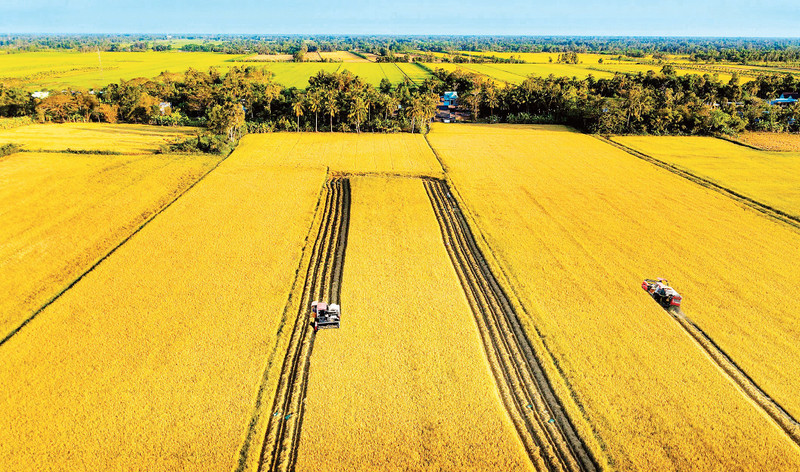Farming in harmony with nature
In recent years, a number of agricultural models have emerged across the Mekong Delta, contributing to improved livelihoods, enhanced climate resilience, and the promotion of sustainable development for local communities.

Transforming agricultural production models
In Giong Bang hamlet, Thuong Phuoc commune (formerly Thuong Phuoc 1, Hong Ngu district), now part of Dong Thap province, 65 farmers have adopted a new model that replaces the traditional three rice crops a year with the integrated rice–fish farming model during the flood season, spanning over 100 hectares.
Dang Van Be, a participant in the model, reported encouraging initial outcomes. “Our fields are enriched with alluvial deposits and flushed clean of chemicals and pests, significantly reducing the cost of the following rice crop,” he explained. “But more importantly, the model has raised farmers’ awareness about limiting the use of pesticides—we now only use biological agents to avoid harming the fish,” he added.
According to the Dong Thap Provincial Department of Agriculture and Rural Development, prior to the recent administrative merger, the province had already implemented sustainable soil and water management practices across 20,000 hectares of farmland to cope with climate change. Specifically, the new model generated an average net profit of nearly 51 million VND per hectare, 21 million VND higher than conventional farming methods.
Encouraged by these positive results, Dong Thap has expanded the ecological farming model to other areas. By the end of 2024, an additional 2,000 hectares had been converted to the new model. Although initial profits remain modest, many farmers have leveraged these flood ponds to develop community-based ecotourism, helping to increase their income. The model also lays the foundation for Dong Thap’s participation in the broader national project to cultivate one million hectares of high-quality, low-emission rice.
Scaling up new products from the model
Back in 2010–2011, a widespread movement to build dykes and cultivate a third annual rice crop took hold across the Mekong Delta. Key provinces like An Giang and Dong Thap established extensive dyke systems covering thousands of hectares.
However, after the initial success in the early years, prolonged cultivation of a third annual rice crop increasingly led to soil degradation, rising input costs, and more frequent outbreaks of pests and diseases. As a result, yields declined in subsequent years, leading to more frequent financial losses. In response to this situation, the Mekong Delta Integrated Climate Resilience and Sustainable Livelihoods Project (WB9) was launched in 2016. The project promotes an adaptive approach to agriculture—rather than “fighting” nature by building dykes to maintain triple-cropping, farmers are encouraged to embrace nature by abandoning the third crop and allowing floodwaters to return.
After eight years of implementation (2016–2024), Deputy Minister of Agriculture and Rural Development Nguyen Hoang Hiep noted that the project has supported livelihood transitions for many local residents, with 54 different ecological models receiving assistance and delivering positive outcomes. The initiative has helped transform lives and provided sustainable ecological livelihoods for nearly two million people in the region. Notably, many farmers have adopted a new mindset in production, choosing to stay in the delta rather than migrate elsewhere in search of alternative livelihoods.
In addition, the project has invested heavily in coastal infrastructure, including the rehabilitation and upgrading of nearly 350 kilometres of dykes, integrated with improvements to rural transport networks. It has also built 160 sluice gates and bridges, along with nearly 45 kilometres of wave-dissipating revetments to encourage sedimentation and protect the shoreline—all in support of livelihood transformation.
The project also invested heavily in coastal and rural infrastructure, including the rehabilitation and upgrading of nearly 350 kilometres of dykes, construction of 160 sluice gates and bridges, and nearly 45 kilometres of wave-dissipating revetments to create sedimentation zones and protect coastlines—facilitating the shift to sustainable livelihoods.
However, Deputy Minister of Agriculture and Environment Nguyen Hoang Hiep said that the Mekong Delta continues to face significant challenges, including upstream developments, climate change, and sea-level rise progressing faster than anticipated.
Building on the success of WB9, the Ministry of Agriculture and Environment, the Ministry of Finance, and the World Bank have proposed a new project — the Mekong Delta Climate Resilience and Integrated Transformation Project (MERIT or WB11). With an investment of nearly 17 trillion VND, it aims to continue strengthening the region’s resilience, with participation from 10 provinces. The project is scheduled to be implemented during the 2025–2033 period.
The project focuses on adjusting three regional approaches towards nature-based development and controlled adaptation. It is expected to facilitate the conversion of around 300,000 hectares to climate-resilient and sustainable farming models across provinces in the Mekong Delta. The total area of indirect benefit is estimated at 600,000 hectares, with approximately three million people expected to benefit directly.








